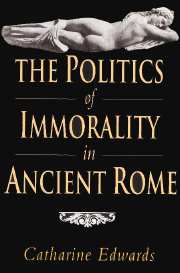Book contents
- Frontmatter
- Contents
- Preface
- Introduction
- 1 A moral revolution? The law against adultery
- 2 Mollitia: reading the body
- 3 Playing Romans: representations of actors and the theatre
- 4 Structures of immorality: rhetoric, building and social hierarchy
- 5 Prodigal Pleasures
- Bibliography
- Index locorum
- Index of subjects and proper names
1 - A moral revolution? The law against adultery
Published online by Cambridge University Press: 23 September 2009
- Frontmatter
- Contents
- Preface
- Introduction
- 1 A moral revolution? The law against adultery
- 2 Mollitia: reading the body
- 3 Playing Romans: representations of actors and the theatre
- 4 Structures of immorality: rhetoric, building and social hierarchy
- 5 Prodigal Pleasures
- Bibliography
- Index locorum
- Index of subjects and proper names
Summary
In 62 bce, a young and politically ambitious Roman aristocrat, Publius Clodius, is said to have disguised himself as a women in order to infiltrate the rites of the Bona Dea which it was sacrilege for men to observe. His purpose, according to his detractors, was to seduce the wife of Julius Caesar, the Pontifex Maximus, in whose house the ceremony was taking place. A man dressed as a woman, the profanation of religious rites, adultery with the wife of one of the leading men in Rome and the adulterer already notorious for his pernicious and disruptive political dealings – this incident, related or alluded to by numerous Roman authors, summed up the disorder of the final years of the republic. For Roman writers, adultery among the elite was a telling symptom of disease in the body politic.
Another young and politically ambitious, though rather less aristocratic, man effected what was claimed to be the cure, restoring the res publica to health, moral as well as political. Rome's first emperor, Augustus, the new Romulus, promised a revolution – a return to the past. In the early days of Rome, wives were chaste; he initiated legislation making adultery a crime. Augustus boasted, in his Res gestae: Legibus novis me auctore latis multa exempla maiorum exolescentia iam ex nostro saeculo reduxi, ‘Through new laws passed on my proposal, I brought back many of the exemplary practices of our ancestors which were falling into neglect’ (8.5).
- Type
- Chapter
- Information
- The Politics of Immorality in Ancient Rome , pp. 34 - 62Publisher: Cambridge University PressPrint publication year: 1993

